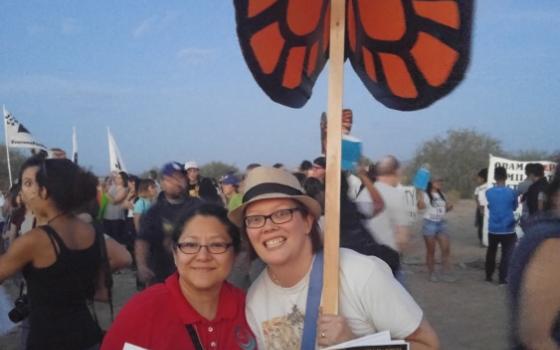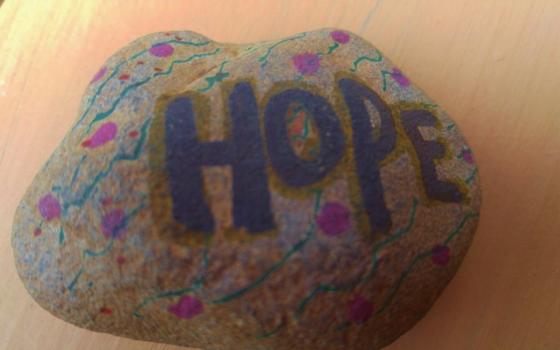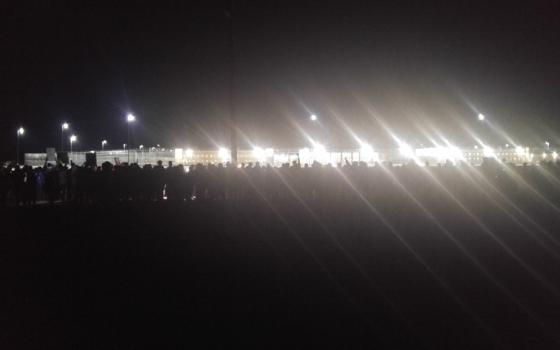With one hand I grip my luggage and move slowly down an air-bridge at the Dallas-Fort Worth airport. With my other hand, I reach around to check that my backpack is securely zipped. My skin brushes a cool and smooth rock poking through the mesh pocket on the outside of my bag. I turn to my friend, Sister Priscilla, and point to the palm-sized glacial stone decorated with colored markers. With a hushed voice I quickly explain, "I forgot this hope rock was in my bag, I made it when I was leading a retreat a few weeks ago. I'm glad I'm bringing a hope rock to the border."
Sister Priscilla and I were on our way to meet other members of Giving Voice at the Tucson airport so we could go to the SOAW Convergence at the Border. In Nogales, the giant border town that straddles the line between southern Arizona and northern Sonora, we would join immigrants, activists, and other religious for a weekend of speeches, song, and prayer. We would rally on both sides of the border fence, not far from where José Antonio Elena Rodríguez, 16, was shot and killed by U.S. border patrol four years prior. But first, we were heading north to the Eloy Detention Center, a grim holding place for immigrants detained in legal limbo.
Sister Priscilla and I hadn't planned to travel together and had reunited by happy coincidence. We found ourselves marveling at the many things that had occurred to make this moment happen, all the work that had gone into coordinating Giving Voice's solidarity with the border convergence. The last time Sister Priscilla and I were together was during a meeting in St. Louis in May when a group of Giving Voice sisters gathered to develop our facilitation skills and learn the Circle Way process.
On that weekend, our discussions had been spirited, with a sense of call. We desired to go to the border, to show our solidarity with the immigrant brothers and sisters, to raise our prophetic voices on behalf of those who were most threatened by the violent political rhetoric tormenting our country. Through the summer months we spent many hours meeting and planning. Our plans evolved and leadership changed. Still, we continually felt guided by the Spirit, moved by a persistent hope.
In the end, Sister Priscilla and I would be two of six Giving Voice sisters at the Border Convergence where we'd lead an Encuentro de Hermanas for other Catholic sisters and their associates. Throughout the same weekend dozens of other Giving Voice sisters would be leading solidarity prayer services in places as varied as North Dakota, California, Iowa and Texas.
______
I am snugly seated next to a snoring stranger on the airplane. I press my face close to the glass and gaze at the brown and green landscape below, seemingly moving under me like waves. From this unusual vantage, I catch a glimpse of my tiny part in a giant picture. I have put forth a labor of love and am traveling thousands of miles because I believe our nation needs to reform its immigration system, yes. But even more so, I realize, I am going to all these great lengths because hope is very alive in my heart. Faith has me believing that service and organizing matters and makes a difference. Hope has me trusting that this action will change things for the better, that each little effort helps us move closer to God's reign of peace, justice, welcome and compassion here and now.
That evening in a rented van, Sister Priscilla and I drive north from Tucson through cotton fields to join the vigil at the Eloy Detention Center. Along the way, a sister pulls out her phone and reads some sobering facts. Eloy is one of the largest detention centers in the nation; over 1,500 people are detained inside while awaiting a trial or deportation. It is a privately owned prison, under contract with Immigrations and Customs Enforcement. Fourteen people have died inside, five of them by suicide. Even while measles and other epidemics have made people ill, they have been denied basic medical care, and sometimes given only water in place of medicine.
______
Tires swirl up clouds of tan dust as more vehicles roll in and park along a makeshift road. The brightness of a desert day begins to dim while the crowd expands. On the western horizon the metal and concrete detention center looms in the distance, a gray obstruction to the natural beauty of a diverse community coming together in the desert for a night of prayer and witness.
Toes exposed through sandal straps, my feet stir up the dust of the desert as I weave through the crowd. We join hundreds facing a stage and stand between thorny plants. I notice we are standing on tiny seashells mixed into the sand, a silent reminder that this desert was once a seabed. If Earth and all its history could speak to us, I have a feeling we would hear scoffs about the arbitrary borders of nations.
Upon these sands, the presence of this crowd has dotted the flat, tan and blue landscape with colors of hope. Brown, black, white, old and young — hands of all sorts hold flags, signs and banners declaring why we are here in Spanish and English: "Full Rights for the Undocumented!" "Justice," "Solidarity, Not Walls," "No Mas Muertes," (No More Deaths) and "End All Detention." Other posters show the faces and names of those who are in detention or who have died in detention. These are created by family members who want us to remember their loved ones, from whom they have been so unjustly separated.
As the sun sets, candles are passed through the crowd. We are led in song and asked to follow through the dark toward the detention center. We chant and sing, and hundreds of us huddle together in the candlelight. We line a sidewalk on the edge of the detention center and gaze into floodlights, illuming the gray concrete. We continue to sing and chant in Spanish and English and wave our lights. For a brief second I wonder if they know we are here and if this effort matters. Then I notice that in the distance, in windows that could be part of cells, the lights look as if they are flickering in acknowledgement. Or, perhaps those detained are moving blankets up and down in front of the glass to wave back to us. When we all see it, we begin to cheer more loudly, with more joy in our voices. Our light and love has created a celebration, a strong connection.
It's a small gesture, perhaps impotent in the overwhelming reality. Then again, maybe it will be remembered, like a smooth stone in a pocket, a feeling of reassurance. They heard us. They know we are here for them. They know we care and are working to make things better. For those inside and for those of us who traveled across the nation to vigil on this holy ground, hope is the rock that holds us.
[Julia Walsh FSPA is a retreat presenter and blogger found online at MessyJesusBusiness.com.]
More from the convergence event - At US-Mexico border, SOA Watch focuses on the same message through a new lens



